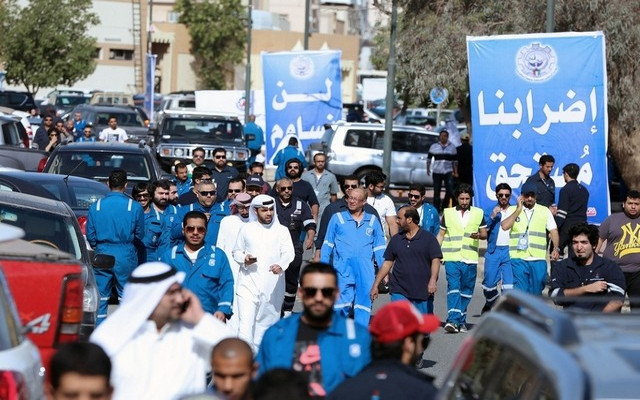In Kuwait last week, thousands of Kuwaiti oil and gas industry workers launched a three-day strike in protest over cuts to their wages and benefits. The protest marked a clear sign of how low-waged workers, such as nationals employed in the oil fields as well as other migrant workers employed in the construction and service sectors, are the first to be impacted by the current economic slump in the Gulf as a result of falling oil prices.
On April 17, an estimated 6,000 members of the Oil & Petrochemical Industries Workers Confederation walked off the job to protest delays in the payment of wages and a slash in benefits. Workers also protested plans to privatize parts of the energy industry as well as proposed public sector reforms, measures the Kuwaiti government are considering to cushion the effects of the falling price of oil. A new payroll scheme proposed by the Kuwaiti government for workers employed in the public sector would entail an automatic cut in wages and benefits, and would include oil and gas industry workers.
In response to the protest, the Kuwaiti government mobilized units of the National Guard and deployed them to the oil fields to monitor the strike. On the strike’s second day, the Deputy Premier and Acting Oil Minister Anas Al-Saleh called on the workers to end their strike but the workers union boycotted negotiations and continued their protest. The Kuwaiti state news agency reported that the workers officially ended their strike on April 19 “in appreciation of His Highness the Amir” Sheikh Sabah Al-Ahmad Al-Jaber Al-Sabah. The strike reportedly more than halved crude output, causing Kuwait’s oil production to plummet from 2.8 million barrels a day to 1.1 million barrels a day.
Although Kuwait has ratified seven core ILO labor conventions, some workers remain excluded. The state ratified ILO Convention No. 87 on Freedom of Association and Protection of the Right to Organise in 1961, and Convention No. 98 on the Right to Organise and Collective Bargaining in 2007, but the latter applies only to workers in the private sector. The right to form or join a union is granted to Kuwaiti nationals, but is partially denied to migrants. Foreign workers are only allowed to join a union, and are barred from electing officers or being elected. This is due in part to a controversial sponsorship system known as kafala that circumscribes several rights afforded to all workers, as well as a weak labor law that excludes certain migratory populations such as migrant domestic workers. The right to strike and form unions is a fundamental right entitled to all workers, as they allow workers the ability to express grievances and seek redress.
As the Kuwaiti oil worker strike indicates, low-waged workers employed in the GCC are disproportionately affected by the Gulf-wide economic crisis.





